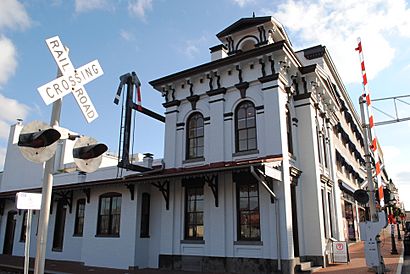Gettysburg station facts for kids
Quick facts for kids
Gettysburg Lincoln Railroad Station
|
|||||||||||
|---|---|---|---|---|---|---|---|---|---|---|---|

The c. 1858 Italianate depot with arched windows, cornice moldings, and a low-pitched roof with eaves (the 1-story addition was in 1886,).
|
|||||||||||
| Other names | Gettysburg Train Station Lincoln Train Station Western Maryland Railroad Station |
||||||||||
| Location | 35 Carlisle Street Gettysburg, PA United States |
||||||||||
| Coordinates | 39°49′55.232″N 77°13′51.46″W / 39.83200889°N 77.2309611°W | ||||||||||
| Owned by | Gettysburg National Military Park | ||||||||||
| Operated by | Gettysburg Foundation | ||||||||||
| Line(s) |
|
||||||||||
| Platforms | 1 | ||||||||||
| Tracks | 1 | ||||||||||
| Construction | |||||||||||
| Structure type | At-grade | ||||||||||
| Bicycle facilities | Yes | ||||||||||
| History | |||||||||||
| Opened | May 1858 | ||||||||||
| Closed | December 31, 1942 | ||||||||||
| Key dates | |||||||||||
| 1863-1865 | Service is interrupted at the station as the Confederate Army made its way north and engages the Union Army during the Gettysburg Campaign. Service is only restored following repairs to the rail lines and bridges. | ||||||||||
| Former services | |||||||||||
|
|||||||||||
|
Gettysburg Train Station
|
|||||||||||
|
U.S. Historic district
Contributing property |
|||||||||||
| Location | Gettysburg, Pennsylvania | ||||||||||
| Built | c.1858 | ||||||||||
| Restored | 2009 | ||||||||||
| Restored by | Gettysburg Foundation | ||||||||||
| Part of | Gettysburg Battlefield Historic District (ID75000155) | ||||||||||
| MPS | Battle of Gettysburg MPS | ||||||||||
| Designated CP | March 19, 1975 | ||||||||||
The Gettysburg Lincoln Railroad Station is a famous old train station in Gettysburg, Pennsylvania. People also call it the "Gettysburg Train Station" or "Lincoln Train Station." It was open from 1858 to 1942.
This station is a very important part of the Gettysburg Battlefield Historic District. It's most famous because Abraham Lincoln, who was president at the time, arrived here on November 18, 1863. He left the next day after giving his famous Gettysburg Address.
During the Civil War, the station was used as a hospital. It helped send wounded soldiers away and brought in important supplies. Today, the Gettysburg National Military Park owns the station, and the Gettysburg Foundation helps manage it.
Contents
History of the Station
The Gettysburg Railroad line was finished and reached Gettysburg in December 1858. The train station itself was built around the same time. It was located at the corner of Carlisle and Railroad Street.
The station was an important building for the town. It had waiting rooms for men and for women and children. There was also an office where people could buy tickets.
The Civil War and the Station
Train service to the station stopped on June 27, 1863, when Confederate soldiers burned a nearby bridge. Luckily, the station itself was not damaged during the Battle of Gettysburg.
After the battle, the station became a busy place. It was used as a hospital for wounded soldiers. By the end of July, almost 15,000 injured troops passed through the station on trains. An army medical inspector even used the depot to help organize the transport of the wounded.
A Brave Telegrapher
As Confederate forces got close to Gettysburg, a young telegraph operator at the station showed great bravery. She was the adopted daughter of a "Mr. Lee" from Washington, Pennsylvania. She quickly took her telegraph machine from the station. She connected the wires so the telegraph could still work.
She carried the machine to Cemetery Hill and taught soldiers how to connect it. She then used the telegraph to send important information for the Union Army. She stayed there throughout the battle, even as soldiers around her were hit by bullets. After the battle, she returned to the station to continue her work. Her name was not widely known at the time, but her actions were truly heroic.
President Lincoln's Visit
President Abraham Lincoln arrived at the Gettysburg Train Station on November 18, 1863, at 6:00 p.m. He came to speak at the dedication of the Gettysburg National Cemetery.
The next day, November 19, 1863, he gave his famous Gettysburg Address. After his speech, he departed from the same station 24 hours after he arrived. This made the station a very special place in American history.
After the War
Over the years, the railroad line that served the station became part of several different railway companies. The last passenger train left the station on December 31, 1942. After that, passenger service stopped.
The station was still used for managing freight trains and sending telegraph messages until 1948. Later, in 1955, the building was leased to the Gettysburg Travel Council.
Saving the Station
By the 1990s, the station was in poor condition and almost falling apart. People decided it needed to be saved. In 1998, the Borough of Gettysburg bought the property.
Renovation work began in January 2005 and was finished in 2006. The station had a grand re-opening to celebrate its history, especially Lincoln's visit. Since 2008, the National Trust for Historic Gettysburg has helped operate the station.
Gettysburg Railroad Museum
Today, the first floor of the Gettysburg Lincoln Railroad Station is a museum. It's open every day and is free to visit!
The museum has models, diagrams, and exhibits that tell the story of the station and its role in history. You can also see artifacts that were found during the station's renovation. It's a great place to learn about trains, the Civil War, and President Lincoln.
 | Shirley Ann Jackson |
 | Garett Morgan |
 | J. Ernest Wilkins Jr. |
 | Elijah McCoy |

